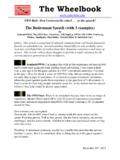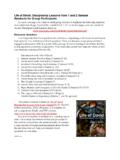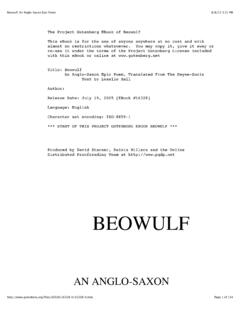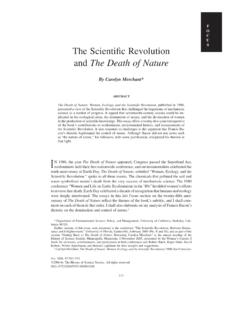Transcription of The Bathsheba Syndrome: The Ethical Failure of Successful ...
1 The Bathsheba Syndrome: The Ethical Failure of Successful Leaders Dean C. Ludwig Clinton 0. Longenecker ABSTRACT. Reports of Ethical violations by upper level managers continue to multiply despite increasing attention being given to ethics by firms and business schools. Much of the analysis of these violations focuses on either these managers' lack of operational principles or their willingness to abandon principles in the face of competitive pressures. Much of the attention by firms and business schools focuses either on the articulation of operational principles (a deontological approach) or on the training of managers to sort their way through subtle Ethical dilemmas in the face of competitive pressure (a utilitarian approach).
2 While valuable, these ap-proaches alone are incomplete. This paper suggests that many Ethical violations by upper managers are the by-product of success -not of competitive pressures. Our research suggests that many managers are poorly prepared to deal with success. First, success often allows managers to become complacent and to lose focus, divert-ing attention to things other than the management of their business. Second, success, whether personal or organiza-tional, often leads to privileged access to information, people or objects. Third, with success usually comes increasingly unrestrained control of organizational resources.
3 And fourth, success can inflate a manager's belief in his or her personal ability to manipulate outcomes. Even individuals with a highly developed moral sense can be challenged (tempted?) by the "opportunities" resulting from the convergence of these dynamics. We label the inability to cope with and respond to the by-products of success "the Bathsheba Syndrome," based on the account of the good king david (a story Dean C. Ludwig is an Assistant Professor of Management and Director of the Center for Family Business at the University of Toledo. His teaching and research focuses one Ethical issues in management and marketing.)
4 Clinton 0. Longenecker is an Associate Professor of Management at the University of Toledo and has published a variety of articles in both academic and professional journals on the topic of performance appraisal and the management of managers. Both have extensive industrial and educational experience and are active management consultants. journal ofBusiness Ethics 12: 265-273, 1993. 1993 Kluwer Academic Publishers. Printed in the Netherlands. familiar in a variety of traditions). Recognition of this phenomenon implies that we change or broaden our ap-proach to the teaching of business ethics.
5 It also implies that organizations must re-evaluate and change structures, proce-dures, and practices which enhance the likelihood of man-agers falling victim to the Bathsheba Syndrome. Introduction The story of david and Bathsheba is familiar in a variety of traditions. Accounts of king david 's life are contained in both the Old Testament and the Torah. These accounts describe a leader with a humble past, a dramatic and rapid rise to power, strong organizational skills, a charismatic person-ality, an ecclectic approach to problem solving, a strategic vision for his people, and a man of high moral character .
6 In his day, he was a man who had it all. He had power, influence, wealth, physical com-forts, loyal servants, a strong army, and a growing prosperous country. He was a king . Yet despite both the quality of his life and his moral character , king david was a leader who got caught up in a down-ward spiral of unethical decisions that had grave consequences for both his personal life and the organization that he was called upon to lead and protect. david 's failings as a leader were dramatic even by today's standards and included an affair, the corruption of other leaders, deception, drunkenness, murder, the loss of innocent lives, and a "we beat the system" attitude when he thought he had managed to cover-up his crimes.
7 The good, bright, Successful , popular, visionary king , david , was nearly destroyed because he could not control his desire to have something that he knew it was wrong for him to have - Bathsheba . Was david a leader lacking in principle? All 266 Dean C. Ludwig and Clinton 0. Longenecker accounts indicate that david was a man of strong principle and discernment. Did david abandon principle in the face of tough competitive pressure? At the time of david 's indiscretion, he had just finished a series of triumphant campaigns and was riding the crest of success and popularity.
8 Was david 's a poor choice in the face of subtle, com-peting goods? david clearly knew the gravity of the violation he was engaging in and clearly knew the penalty if exposed. How did david , a good, talented, and Successful leader get entangled in this downward spiral of events? Could his fall have been prevented? Would our current ethics training have helped david ? david 's story appears in our newspapers with increasing frequency. We read of good, respected, Successful leaders, men and women of intelligence, talent, and vision who suddenly self-destruct as they reach the apex of their careers.
9 Consider the follow-ing four all too familiar composites adapted from recent news accounts: The CEO of a prominent southern savings & loan is indicted for conspiracy to defraud. In his youth he was a model student and an eagle scout. He has been a promi-nent member of his church, a spokesman against child abuse, and a man of integrity and conviction according to his friends. The mayor of large midwestern city is driven from office under accusations of marital infidelity and influence peddling that have enraged his constituency. Of humble Hispanic background, he was considered a rising star, a man who fought for minority rights, a model for minority aspirations, and a person whose life up to that point was beyond reproach.
10 The hard-working division president of a west coast plastics company was recently dismissed from his job because of gross abuse of his expense account, an affair with his secretary, and rumors of a drug problem. The CEO who fired him stated, "He was one of the brightest and best people I've known, and I've never known him to do anything wrong in his life until just recently. Then he self-destructed." A prominent religious leader is forced to resign from his national office after growing a small organization into a Successful national one. He has worked as a missionary overseas in a third world country, set up soup kitchens for the poor, worked hard to help people deal with addictions, and he has fallen because of fraud and tax evasion.















